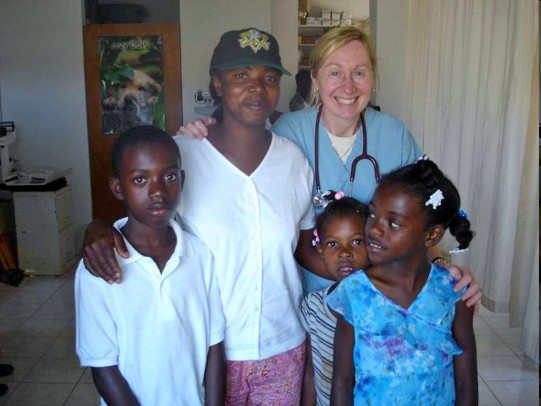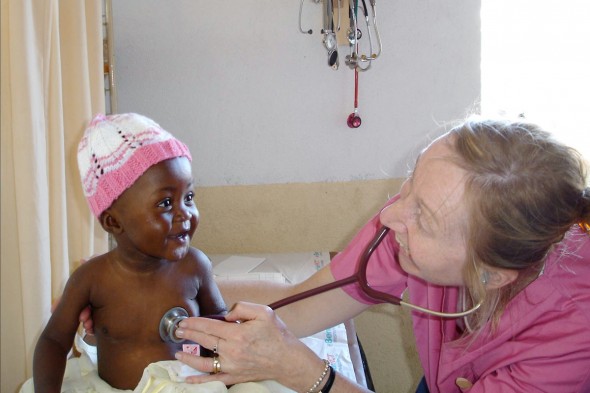Bringing health care, hope to Haiti

Sue Walsh, right, with a family in Haiti. She has been traveling there since 2006, helping to provide health care for women and children.
Sue Walsh is spending her spring break in Haiti, providing medical care to women and children.
It isn’t the first university break Walsh has spent volunteering there. She has led health care teams to Haiti, including UIC nursing students, about four times a year since 2006.
“Health care in Haiti, as in all low-resource countries, needs capacity building because they don’t have enough educated health care professionals to provide the health care they need,” Walsh said.
“Any effort that we make to advance the capacity building is made with the concept of sustainability. We don’t go in and do and leave.”
For her efforts in Haiti, Walsh was awarded the Chicago Women of Concern Humanitarian Award Feb. 28 in Chicago from the humanitarian organization Concern Worldwide U.S.
Walsh, a teaching associate in the College of Nursing’s department of women, children and family health science, joined UIC in 2000 as a clinical instructor. She received her undergraduate degree in 1980 from UIC and graduated from the pediatric nurse practitioner program in 2000.
Walsh partners with two nonprofit groups in Haiti, Little by Little and Mountaintop Ministries, to determine where she and her team can be most helpful. Her efforts primarily focus on women and children’s health.
She was leading a medical team at a clinic in Haiti on Jan. 12, 2010, when the catastrophic earthquake struck.
“It was the most devastating, profound — I don’t even have words for it,” she said. “We were first responders and right at the epicenter of the earthquake. At the same time, it was also the most interconnecting human experience any of us could experience.”
Before the earthquake, she said, “there was some political unrest and there wasn’t a very unified approach to health care, so one of the goals was helping them figure out a system of sustainability.”
After the earthquake struck, her focus changed. She wrote about the experience in her 2011 book, Walking in Broken Shoes: A Nurse’s Story about Haiti and the Earthquake.

“Health care in Haiti, as in all low-resource countries, needs capacity building because they don’t have enough educated health care professionals to provide the health care they need,” Walsh says.
“It devastated any efforts that were happening,” she said. “There were two major hospitals — one was completely demolished and the other was left with a lot of damage. The government, municipalities collapsed. Everything was just destroyed.”
Two years after the quake, millions of people still lived in tent cities, Walsh said. But four years later, the country is making more progress in its rebuilding efforts.
“All of a sudden, the infrastructure is amazing — roads have been repaired and much rebuilding is happening,” she said. “There are many progressive new political ideas and government-sanctioned health and education initiatives.”
Her student volunteer teams are coordinated by the College of Nursing’s Global Health Leadership Office.
“They do an incredible job and have a really deep interest in enriching the international experiences and programs for students here in the college,” Walsh said.
The volunteer experience not only helps those in need in Haiti, but it also provides a deeper understanding for nursing students, Walsh said.
“To go to a place like Haiti makes students take a step back because they don’t speak the language and have never seen that level of poverty,” she said. “You experience these disparities at a very visceral level.
“Students learn to have cultural deference, cultural humility. The students come back very changed and very open.”
Categories
Topics
awards, disaster relief, earthquake, global health, Haiti, health care, humanitarian aid, nursing, volunteerism
